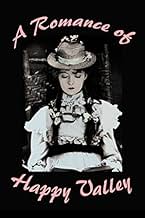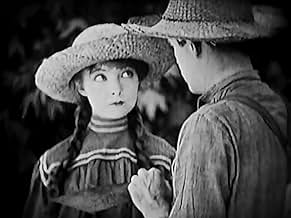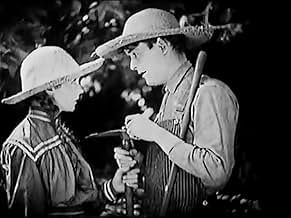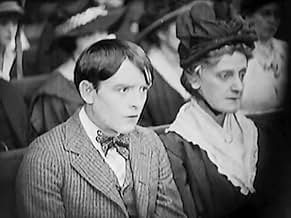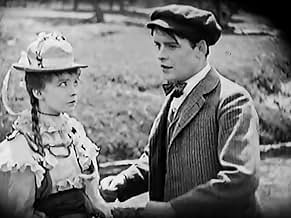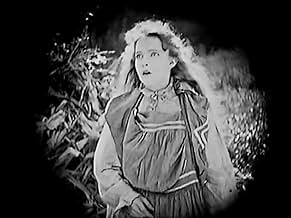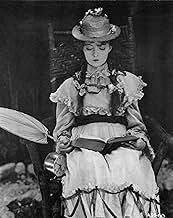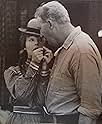Füge eine Handlung in deiner Sprache hinzuJohn Logan leaves his parents and sweetheart in bucolic Happy Valley to make his fortune in the city. Those he left behind become miserable and beleaguered in his absence, but after several ... Alles lesenJohn Logan leaves his parents and sweetheart in bucolic Happy Valley to make his fortune in the city. Those he left behind become miserable and beleaguered in his absence, but after several years he returns, a wealthy man.John Logan leaves his parents and sweetheart in bucolic Happy Valley to make his fortune in the city. Those he left behind become miserable and beleaguered in his absence, but after several years he returns, a wealthy man.
- Regie
- Drehbuch
- Hauptbesetzung
Carol Dempster
- Girl John Logan meets in New York
- (Nicht genannt)
Empfohlene Bewertungen
Must all director D.W. Griffith's stories make a moral point? "A Romance of Happy Valley" offers one readily: "Harm not the stranger within your gates, lest you yourself be hurt." By the film's end, this is shown to be excellent advice. At a Kentucky back-country inn, poor country boy Robert Harron (as John L. Logan Jr.) dreams about making his fortune in the Big City (New York). Hard-working father George Fawcett (as Logan Sr.) and Bible-loving mother Kate Bruce (as Mrs. Logan) don't want to see their son gallivant off to the Wicked City; they want him to remain down on the farm. Girl-next-door Lillian Gish (as Jennie Timberlake) is also afraid she will lose Harron to big city ways
Robert Harron and Lillian Gish. Corn rustling in the wind. Rustic fences. Of course, this an absolutely gorgeous picture. Griffith and photographer G.W. Bitzer create an extraordinary, classic landscape; and, "A Romance of Happy Valley" is one of their most perfect collaborations. Harron is especially poignant; portraying "Johnny Logan" as an innocent country boy who longs to better his lot in life. His is the film's struggle: the comfort and stability known in simple, rural life vs. the promise of wealth in the unknown, urban city. The story is about Temptation; and Harron must navigate it successfully, or die trying
The film begins with lovely images: Harron working the fields; Gish in her fenced lawn. Then, they court; in a great scene, the two use their hands on a farm tool, to express their emotions. After Harron decides to leave for New York, Gish and Harron's parents endeavor to change his mind. Gish dons herself in the latest fashions, and his parents trust their Minister will change Harron's wayward ways. In Church, Gish looks woeful; and Harron looks desperately ill (showing his soul). The plan works; however, Harron's salvation is short-lived. Then, Harron leaves for Sin City; where he decides to make his fortune by inventing a toy frog that swims
The symbolism is rich; and, when the toy frog swims, so does Harron. When he goes home, Harron finds his parents have grown desperately poor. Mother Bruce has faith that the Lord will provide. Father Fawcett is unable to avoid his own Temptation; so, to save the farm, he decides to assault the rich stranger in town, unaware the "city slicker" is his own son. Although he is matured by his experience in the city, Harron's character is untainted by Temptation; note the nonthreatening manner Harron displays at Gish's bedroom window, near the end. Harron startles, but does not frighten Gish; he is transformed into an ideal man, who retains his better country traits.
Robert Harron was the "Best Actor" performing in films during 1919, with the following remarkable, and highly recommended, features: A Romance of Happy Valley (1919), The Girl Who Stayed at Home (1919), The Greatest Question (1919), and True Heart Susie (1919). Frequent co-star Lillian Gish was filmdom's "Best Actress"; of these films, she is most remarkable in "True Heart Susie". Griffith's reliable supporting cast is wonderful, as always. Aside from the aforementioned supporting players, "Happy Valley" includes the reliably smarmy Bertram Grassby as "Judas", who is said to be descended from the original Iscariot. And, Carol Dempster has a nice turn as a wicked city woman. The ending is very exciting, and Griffith improves significantly upon his earlier "The Son's Return" (1909).
********* A Romance of Happy Valley (1/26/19) D.W. Griffith ~ Robert Harron, Lillian Gish, George Fawcett, Kate Bruce
Robert Harron and Lillian Gish. Corn rustling in the wind. Rustic fences. Of course, this an absolutely gorgeous picture. Griffith and photographer G.W. Bitzer create an extraordinary, classic landscape; and, "A Romance of Happy Valley" is one of their most perfect collaborations. Harron is especially poignant; portraying "Johnny Logan" as an innocent country boy who longs to better his lot in life. His is the film's struggle: the comfort and stability known in simple, rural life vs. the promise of wealth in the unknown, urban city. The story is about Temptation; and Harron must navigate it successfully, or die trying
The film begins with lovely images: Harron working the fields; Gish in her fenced lawn. Then, they court; in a great scene, the two use their hands on a farm tool, to express their emotions. After Harron decides to leave for New York, Gish and Harron's parents endeavor to change his mind. Gish dons herself in the latest fashions, and his parents trust their Minister will change Harron's wayward ways. In Church, Gish looks woeful; and Harron looks desperately ill (showing his soul). The plan works; however, Harron's salvation is short-lived. Then, Harron leaves for Sin City; where he decides to make his fortune by inventing a toy frog that swims
The symbolism is rich; and, when the toy frog swims, so does Harron. When he goes home, Harron finds his parents have grown desperately poor. Mother Bruce has faith that the Lord will provide. Father Fawcett is unable to avoid his own Temptation; so, to save the farm, he decides to assault the rich stranger in town, unaware the "city slicker" is his own son. Although he is matured by his experience in the city, Harron's character is untainted by Temptation; note the nonthreatening manner Harron displays at Gish's bedroom window, near the end. Harron startles, but does not frighten Gish; he is transformed into an ideal man, who retains his better country traits.
Robert Harron was the "Best Actor" performing in films during 1919, with the following remarkable, and highly recommended, features: A Romance of Happy Valley (1919), The Girl Who Stayed at Home (1919), The Greatest Question (1919), and True Heart Susie (1919). Frequent co-star Lillian Gish was filmdom's "Best Actress"; of these films, she is most remarkable in "True Heart Susie". Griffith's reliable supporting cast is wonderful, as always. Aside from the aforementioned supporting players, "Happy Valley" includes the reliably smarmy Bertram Grassby as "Judas", who is said to be descended from the original Iscariot. And, Carol Dempster has a nice turn as a wicked city woman. The ending is very exciting, and Griffith improves significantly upon his earlier "The Son's Return" (1909).
********* A Romance of Happy Valley (1/26/19) D.W. Griffith ~ Robert Harron, Lillian Gish, George Fawcett, Kate Bruce
Lillian Gish getting lovey dovey in her cute hats is the highlight in this creaky old film, but it's interesting that her budding romance is set within the context of country vs. City, a dynamic that's carried forward to the present day. Here New York is referred to as "Sodom and Gomorrah" by a preacher when the young man she has an eye on has aspirations of moving there. He's played by Robert Harron who's got good screen presence as well, but unfortunately this story fizzles because it veers away from being a romance for too long.
In the city there is no great temptation that he faces, just an innocent request to go out "stepping" (dancing), which he declines, so that he and the film can instead spend time rather anemically on him trying to get a toy mechanical frog working, which was a bit like watching paint dry. When he eventually does return home, a crime drama is cooked up with a stranger, which is compounded by a near fatal case of mistaken identity. I don't know if the film was aware of the irony of the crime and violence occurring in the town instead of the den of iniquity of the city, but regardless, it was completely uninteresting, and I longed for Gish to return to the screen.
In the city there is no great temptation that he faces, just an innocent request to go out "stepping" (dancing), which he declines, so that he and the film can instead spend time rather anemically on him trying to get a toy mechanical frog working, which was a bit like watching paint dry. When he eventually does return home, a crime drama is cooked up with a stranger, which is compounded by a near fatal case of mistaken identity. I don't know if the film was aware of the irony of the crime and violence occurring in the town instead of the den of iniquity of the city, but regardless, it was completely uninteresting, and I longed for Gish to return to the screen.
Watching silent films has been of great fascination for quite some time now and there are some truly fine ones, some revolutionary technically or in terms of subject. Not all are great and a few controversial, but there are many great or iconic ones. Among the best of them is the best of DW Griffith, and the more that has been seen of Griffith's work (short and feature films) the more interesting he has come to me. We also have Griffith regular Lillian Gish, among the greatest silent film actresses, in the lead role.
'A Romance of Happy Valley' is not one of Griffith's best, it is not quite 'Intolerance', 'True Heart Susie', 'Orphans of the Storm', 'Way Down East' and 'Broken Blossoms' level, all very good to brilliant. Much prefer it though over 'Birth of a Nation', appreciate its importance but the second half spoilt it significantly for me, and especially 'Abraham Lincoln' (with him being one of not many silent film directors to clearly not transition well into sound). 'A Romance of Happy Valley' is somewhere in the middle as far as his work goes and is a very good representation of Gish.
There is actually not a huge amount wrong with 'A Romance of Happy Valley' in my view. The story is very slight, making for some ploddy moments in the less eventful stretches, and quite old-fashioned.
Do agree too that the ending came over as far-fetched and quite weird even, actually found it rather out of place and shoehorned in and it is a rare case of me saying that an abrupt and pat ending (usually dislike this kind of ending) would have been preferable.
Gish however is wonderful as ever, she is incredibly endearing, radiates charm and has amusing comic timing. She also has the right amount of pathos, something that she conveyed better than any other actress at that time. Robert Harron gives another sensitive and nuanced performance, succeeding in making his on paper slightly bland character interesting. George Fawcett chills the bone and it is scary at how much his character gets away with. Griffith's direction has been more creative in his other films, but it is understated and shows someone that clearly knew what he was doing.
Have no qualms with the production values, the scenery is quaint and the photography has beauty and intimacy, even if this aspect is more distinct in other Griffith films. The story is not perfect, but it has a very big heart, is rich in charm and there is poignant emotion. The characters are not meaty but they're worth engaging with.
In conclusion, good if not great. 7/10
'A Romance of Happy Valley' is not one of Griffith's best, it is not quite 'Intolerance', 'True Heart Susie', 'Orphans of the Storm', 'Way Down East' and 'Broken Blossoms' level, all very good to brilliant. Much prefer it though over 'Birth of a Nation', appreciate its importance but the second half spoilt it significantly for me, and especially 'Abraham Lincoln' (with him being one of not many silent film directors to clearly not transition well into sound). 'A Romance of Happy Valley' is somewhere in the middle as far as his work goes and is a very good representation of Gish.
There is actually not a huge amount wrong with 'A Romance of Happy Valley' in my view. The story is very slight, making for some ploddy moments in the less eventful stretches, and quite old-fashioned.
Do agree too that the ending came over as far-fetched and quite weird even, actually found it rather out of place and shoehorned in and it is a rare case of me saying that an abrupt and pat ending (usually dislike this kind of ending) would have been preferable.
Gish however is wonderful as ever, she is incredibly endearing, radiates charm and has amusing comic timing. She also has the right amount of pathos, something that she conveyed better than any other actress at that time. Robert Harron gives another sensitive and nuanced performance, succeeding in making his on paper slightly bland character interesting. George Fawcett chills the bone and it is scary at how much his character gets away with. Griffith's direction has been more creative in his other films, but it is understated and shows someone that clearly knew what he was doing.
Have no qualms with the production values, the scenery is quaint and the photography has beauty and intimacy, even if this aspect is more distinct in other Griffith films. The story is not perfect, but it has a very big heart, is rich in charm and there is poignant emotion. The characters are not meaty but they're worth engaging with.
In conclusion, good if not great. 7/10
For many years, this film was among a number of D. W. Griffith films from the 1918-1919 season which were considered irretrievably lost. In the 1970s it was discovered in the Gosmofilmfund in Russia, and through some complicated negotiations was acquired by the Museum of Modern Art in time for the Griffth centenary in 1975. Prints in English have the subtitles replaced, as the Russian print was subtitled in Ukrainian. The story is a simple one and personally close to Griffith's heart - a Kentucky lad, played by Robert Harron, is an inventor and hears of opportunity in New York. Although the townsfolk, his mother and father, and his sweetheart, played by Lillian Gish, all try to restrain him from leaving Happy Valley, he does so. In New York, the boy works tirelessly on his invention for eight years and resists a number of temptations. Little does he know that back home, his sweetheart is struggling with similar issues, and when the foreclosure notice comes on the family home, his father, whose opposition to the boy's departure to New York was particularly noisome, experiences a major crisis of temptation himself. The title card identifies this as a "Griffith Short Story" vehicle, and it plays like one of Griffith's Biograph shorts, only much longer. It is not one of his most technically accomplished films, and there are some uncomfortable racial characterizations, though nothing of the kind witnessed in "The Birth of a Nation." But it is a chamber movie, sort of a sketch for "True Heart Susie" and "Way Down East," rural stories told on a more ambitious scale. It contains much of Griffith's idealized vision of his childhood Kentucky, and the desperation of the father may have drawn to some extent on Griffth's own father's struggles late in life. Overall, it is a sweet, unpretentious little film which mean, and does, no harm to anyone. Not a major masterpiece, but an attractive film in a genre that was a Griffith specialty, local in orientation but universal in theme.
Out of all the autobiographys written on Griffith and all of his movies, none come close to tuly identifying the man who was known as the Father of Filmmaking. A Romance of Happy Valley is not only Griffith's vision of what Kentucky was in his eyes, but himself. From Griffith's upbrining as a poor, farmer, his ideal as a businessman and most importanly, his relationship with women are all on display in this movie. Robert Harron portray John Logan, who is without a doubt a young D. W. Griffith. Throughout their careers, Harron anf Griffith were close. The speculation of them being gay has been debated for the last 100 years. Looking into their relationsip as Actor and Director, and what happened to both men off screen has been the subject to much speculation. It is hard to ignore how Griffith showcases Lillian Gish in his portrayal of first love and how a woman is suppose to be treated alongside business and success. A Romance of Happy Vallet is more of a bio-pic of Griffith than a love story.
Wusstest du schon
- WissenswertesBelieved lost for almost 50 years, a print was discovered in 1965 in the State Film Archives of the Soviet Union, which donated it to the Museum of Modern Art.
Top-Auswahl
Melde dich zum Bewerten an und greife auf die Watchlist für personalisierte Empfehlungen zu.
Details
- Erscheinungsdatum
- Herkunftsland
- Sprachen
- Auch bekannt als
- The Romance of Happy Valley
- Produktionsfirma
- Weitere beteiligte Unternehmen bei IMDbPro anzeigen
- Laufzeit1 Stunde 16 Minuten
- Farbe
- Sound-Mix
- Seitenverhältnis
- 1.33 : 1
Zu dieser Seite beitragen
Bearbeitung vorschlagen oder fehlenden Inhalt hinzufügen

Oberste Lücke
By what name was A Romance of Happy Valley (1919) officially released in India in English?
Antwort
